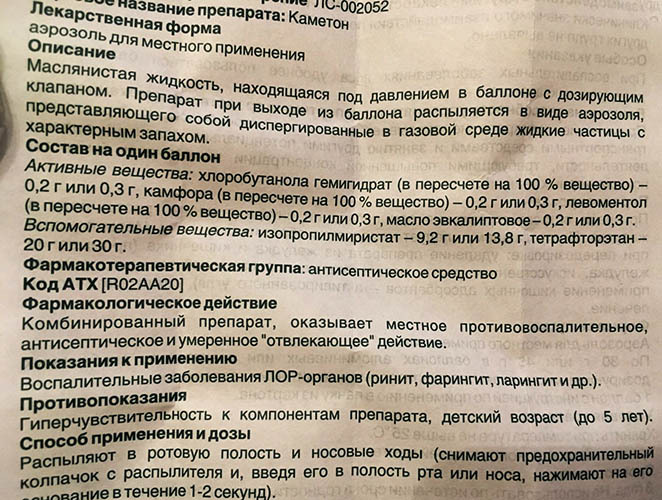Antihistamine Diphenhydramine in ampoules is a potent medicine with a wide range of pharmacological action. It combines an affordable price with highly effective in suppressing allergic reactions.
Record content:
- 1 Indications for use
- 2 Compound
- 3 In what form is it produced?
- 4 Pharmacodynamics
- 5 Pharmacokinetics
-
6 Application
- 6.1 For children under 18
- 6.2 For adults
- 6.3 For pregnant
- 6.4 For the elderly
- 7 Contraindications
- 8 Overdose
- 9 Side effects
- 10 Drug interactions
- 11 Storage conditions and periods
- 12 Conditions of dispensing from pharmacies
- 13 Analogs
- 14 Video about antihistamines
Indications for use
The drug has analgesic and sedative effects. Diphenhydramine in ampoules is intended for parenteral administration. It is used to quickly eliminate anaphylactic symptoms.
The drug is often included in the complex drug therapy of pathological conditions associated with an increase in the concentration of histamine in the blood - a biogenic enzyme, the main mediator of allergic reactions instant type.
Typical indications for the use of Diphenhydramine:
- Quincke's edema;
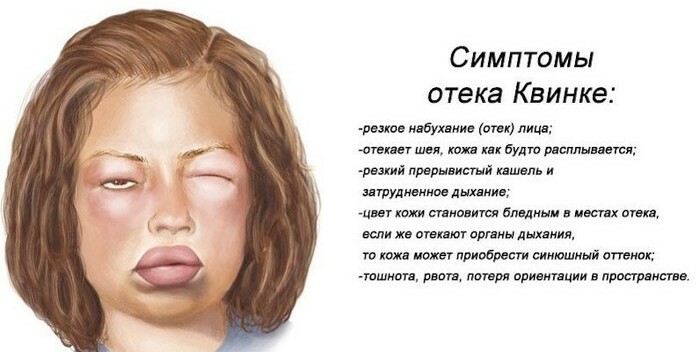
- serum disease - a condition that develops as a result of the use of immune vaccines of animal origin;
- Meniere's syndrome - otolaryngological destruction, manifested in suppuration of the inner ear and an increase in the volume of the labyrinth secretion (endolymph);
- anaphylactic inflammation of the conjunctiva;
- dermatoses accompanied by itching;
- exacerbation of iridocyclitis - an inflammatory process localized in the iris and ciliary body of the eyeball;
- chorea and neurological Parkinson's syndrome;
- radiation sickness;
- vasomotor rhinitis;
- rhinosinusopathy;
- vasculitis of hemorrhagic genesis;
- extensive post-traumatic lesions of the epidermis and soft tissues.
Diphenhydramine in ampoules (its price is low, which made the drug a quick choice for several decades) is used to facilitate falling asleep. It shows good efficacy in sea and airborne diseases.
Compound
Diphenhydramine is a monopreparation with the only active ingredient, diphenhydramine hydrochloride. This pharmacologically active and biochemically aggressive compound belongs to the 1st generation of antihistamines.
Has some narcotic properties, increasing the effect on the body:
- opiates;
- depressants,
- benzodiazepines - psychoactive substances of hypnotic, sedative, anxiolytic and muscle relaxant action;
- alcohol;
- phenobarbital.
Distilled water was used as a biological solvent. 1 ml of parenteral solution contains 10 mg of diphenhydramine hydrochloride. The active substance is an effective histamine antagonist that blocks the corresponding receptors.
In what form is it produced?
The injectable preparation is a clear liquid, colorless and odorless. It is supplied to pharmacies in hermetically sealed ampoules made of medical glass with a capacity of 1 ml. They are packed in contoured mesh blocks of 10 pcs.
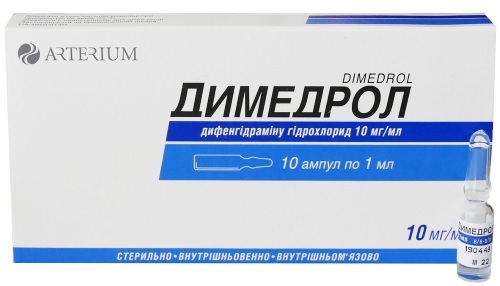
Each cardboard box contains 10 ampoules of the drug and instructions for use. The approximate price in Moscow pharmacies is 100-150 rubles. for a pack of the drug. The medicine is suitable for intramuscular and intravenous administration.
Pharmacodynamics
Diphenhydramine hydrochloride has a pronounced antihistamine activity and the ability to arrest the biological activity of H1 receptors. The chemical compound has a local analgesic effect, relaxes smooth muscles.
The drug moderately blocks the choline receptors of the nerve nodes, quickly eliminates the negative effects caused by the secretion of histamine. Diphenhydramine in ampoules increases vascular permeability, relieves swelling of soft tissues, suppresses hyperemia.
The injectable solution effectively eliminates allergic itching. Thanks to the effect on the choline receptors of diphenhydramine hydrochloride located in the zone of vegetative ganglia, it normalizes blood pressure.
Diphenhydramine has an antiemetic effect, arresting the corresponding centers of the medulla oblongata and significantly reducing their sensitivity. The drug is effective in the spasmodic state of the bronchial tree, which is provoked by the use of histamine liberators - morphine, tubocurarine, and others.
The drug has a blocking effect on the cough center of the brain and has a moderate sedative effect, similar to antipsychotics. Diphenhydramine hydrochloride has no fetotoxic and carcinogenic properties. It does not affect fertility and is not a product of mutagenesis.
Pharmacokinetics
When taken parenterally, diphenhydramine in patients with insufficient volume of circulating blood fluid causes an even greater drop in blood pressure. The medicine is well absorbed by the body, and its bioavailability is about 86%.
The maximum concentration of the active substance in the blood plasma is reached after 30-60 minutes. after injection. The drug almost immediately starts biochemical influence on the process of histamine synthesis. Diphenhydramine hydrochloride binds to protein elements of the blood by 99%.
The antihistamine is mostly metabolized in the liver. It is evacuated by 20% from the body during the deurination process. Metabolic products of diphenhydramine hydrochloride have weak pharmacological activity.
The injection dose of the drug is removed through the urinary tract within 24 hours. The drug is highly permeable and evenly distributed in the tissues of organs, moving along the bloodstream.
Diphenhydramine easily crosses the blood-brain barrier and is able to be absorbed into breast milk. The maximum clinical effect with injection occurs within 60 minutes. The pharmacological intensity of action is 4-6 hours, and the half-life is 8.
Application
Most often, the drug is administered intramuscularly. This is a universal method of administering a medicinal solution, which is equally well suited to almost all categories of patients and for any pathological conditions.
Intravenous injection allows for a slightly faster clinical effect. This method of delivery of parenteral solution, along with infusion administration, is often used in stationary conditions in acute conditions.
Diphenhydramine in ampoules (the price of the drug correlates well with the widest spectrum of action) is served in various doses - from the most gentle to shock. The amount of the injected substance is determined by the patient's age, the nature of the pathology, and other clinical parameters.
Diphenhydramine shows itself well in a mixture with various drugs - Papaverine, Ledocaine, Analgin, and others. In case of sleep dysfunction, an evening intake of the drug is prescribed.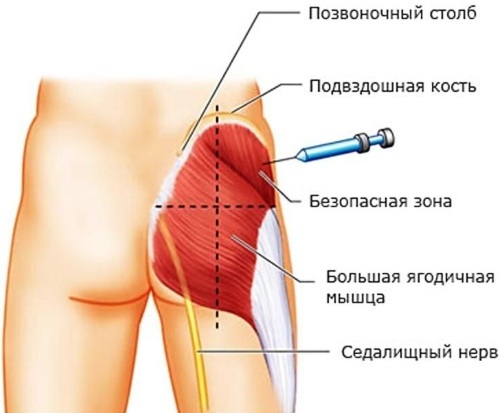
1 ml of active ingredient is injected once in about 30 minutes. before going to bed. In each case, an individual scheme of therapy with diphenhydramine hydrochloride is being developed.
For children under 18
Diphenhydramine belongs to the category of potent drugs with narcotic properties. Therefore, in relation to minor patients, it is rarely used and only in case of extreme clinical need.
If there are contraindications to corticosteroid drugs, the child may be prescribed a one-time diphenhydramine injection to relieve an acute anaphylactic state, bronchospasm, and other dangerous symptoms. The course treatment of children with diphenhydramine hydrochloride is usually not carried out.
The standard regimen for minor patients in the elimination of anaphylactic conditions:
| Age | Recommended average daily dose, ml |
| Up to 1 year | 0,3-0,4 |
| 1-3 years | 0,5-1,0 |
| 4-7 years old | 1,0-1,5 |
| 8-14 years old | 1,5-3,0 |
| 14-18 years old | 1,0-5,0 |
Children under 7 months of age are not prescribed Diphenhydramine in ampoules. The daily volume of the injection solution is divided into 2-3 doses. The interval between injections is at least 6-8 hours.
The daily concentration in the blood of diphenhydramine hydrochloride for minor patients should not exceed 200 mg. In case of systemic allergic reactions under medical supervision, a single administration of an increased dose of the drug is permissible.
For adults
For this category of patients, the standard dosage is 30-50 mg of the drug 2-3 times a day. The duration of the course of treatment is determined by the doctor individually and is usually 10-15 days.
The limiting single dose should not exceed 100 mg of the active ingredient. It is used when necessary to quickly relieve acute symptoms. The highest daily rate of diphenhydramine hydrochloride for adults is 250 mg.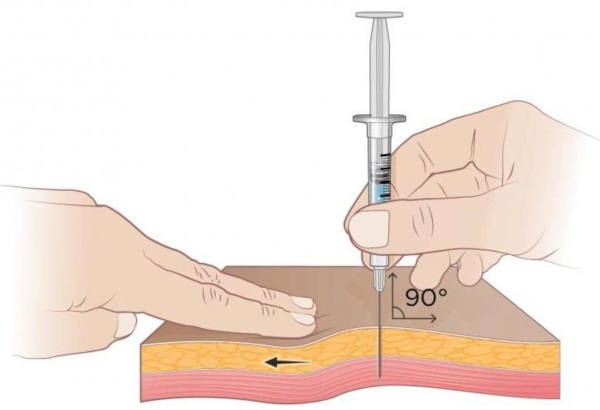
To eliminate the motion sickness effect, which is characteristic of sea and air sickness, intramuscular injections of 25-50 mg of the active substance are used every 4-6 hours. In some cases, adults are prescribed a drip of diphenhydramine in combination with a sodium chloride solution.
For pregnant
Acute anaphylactic reactions are typical for such a physiological state of the female body. Diphenhydramine is a potent antihistamine medication that is not prescribed in the first and second trimesters of pregnancy.
The drug is capable of provoking premature birth, so a preliminary medical consultation is required. It is not recommended to take the medicine during lactation due to the ability of diphenhydramine hydrochloride to pass into breast milk.
In case of emergency and in the presence of contraindications to the use of other antihistamines drugs, a medication for women carrying a child is prescribed in a reduced dosage and for disposable basis.
Diphenhydramine in ampoules should not be present in the blood during pregnancy at a concentration of more than 100 mg at a time. The low price and speed of the pharmacological action of the drug often forces women to resort to injections of this dangerous drug.
The risk of developing intrauterine pathologies is high. Therefore, when carrying a child, it is better to refrain from taking diphenhydramine. Previously, it was used in combination with Analgin to reduce pain during contractions. Today this practice has been abandoned.
For the elderly
Patients over 65 years of age are not prescribed Diphenhydramine due to the ability of the drug to have a pronounced anticholinergic effect.
It manifests itself in:
- violation of accommodation - the adaptability of internal organs to changes in the biological conditions of functioning;
- increased stress on the heart muscle;
- dizziness;
- Difficulty urinating
- intestinal obstruction;
- mental disorder and memory loss.
For elderly patients, the drug in moderate doses is used to treat idiopathy, post-encephalitic syndrome, Parkinson's disease. The recommended dosage for such pathological conditions is 25 mg of the active substance 2-3 times a day with a gradual increase in concentration, if necessary.
Diphenhydramine in ampoules (the price of the drug is affordable, which made it popular) is prescribed to elderly patients to restore sleep function and eliminate anxiety. The medication belongs to obsolete medicines, its independent use at home by elderly people is not justified and dangerous.
Contraindications
Antihistamine solution for injection has an impressive list of clinical prohibitions on the use and situational restrictions.
Diphenhydramine is not prescribed for:
- cardiovascular dysfunctions;
- severe violations in the liver;
- diseases of the pancreas;
- increased biological sensitivity of the body to diphenhydramine hydrochloride;
- endocrine pathologies;
- ophthalmic disorders, in particular, with angle-closure glaucoma;
- stenosis of the bladder neck and other destruction of the urinary system;
- tendency to epileptic seizures - the drug tends to increase their frequency and duration;
- constant convulsive readiness in children;
- hyperplasia of the prostate in men;
- stomach ulcer and perforation of the duodenum;
Diphenhydramine is not used for infiltration into soft tissues in order to suppress pain. This treatment option is capable of provoking necrosis of cell structures. Contraindications include bronchial asthma in the acute phase.
Overdose
Exceeding the maximum daily concentration in the body of diphenhydramine hydrochloride causes depression functions of the central nervous system and provokes the appearance of signs of severe drug intoxication.
Depending on the dose taken, symptoms of depression or, on the contrary, excessive excitement of the brain departments develop.
In case of an overdose, the following are observed:
- dry mucous membranes;
- dizziness;
- impaired coordination of movements;
- cardiac arrhythmia;
- rapid pulse;
- spontaneous increase in body temperature;
- mydriasis - a strong dilatation of the pupils;
- an increase in intracranial pressure;
- a change in the work of the digestive system;
- lethargy;
- depressive state;
- partial paresis of the digestive tract.
With a significant overdose, the patient may fall into a coma. There is no antidote to the active ingredient of the drug. If signs of an overdose are found, symptomatic therapy is performed.
Gastric lavage is performed and absorbent is taken. In case of an overdose of Diphenhydramine, the doctor prescribes drugs to normalize blood pressure, infusion of a plasma-substituting composition. Oxygenation is used - the supply of medicines that saturate the blood with oxygen.
Side effects
Diphenhydramine in ampoules (the price does not justify the harm caused to the body) is an extremely pharmacologically aggressive drug. Its side effects affect almost all functional systems.
Therefore, doctors are gradually abandoning the use of this outdated, albeit effective, fast-acting medicine.
From the side of the central nervous system, Diphenhydramine causes:
- oppression of psychomotor skills;
- decreased tone of nerve fibers;
- a reverse reaction in the form of insomnia;
- uncontrolled tremors of the limbs;
- a state of unmotivated euphoria;
- arterial hypotension.
The cardiovascular apparatus can respond to the administration of the drug with tachycardia and extrasystole.
The following dysfunctions of the respiratory system are observed:
- oppression of the salivary and lacrimal glands;
- dryness of the nasal cavities and larynx;
- increased viscosity of pathological secretions in the bronchi and trachea with inflammation of the respiratory tract;
- confused and labored breathing.
Side effects of diphenhydramine include hemolytic anemia and thrombocytopenia. Diphenhydramine hydrochloride is capable of destroying blood cells. Taking the drug can increase the photosensitivity of the eyes and skin.
Drug interactions
Diphenhydramine enhances the effect of almost all pharmacologically active substances. Therefore, it is often included in therapeutic cocktails. The most common combination is with Analgin.
Although this mixture is considered obsolete, it is still used in clinical practice due to its low cost and relatively high efficiency. Diphenhydramine is often combined with antipyretic medications to enhance their effect.
Most often, this antihistamine medicine is combined with Paracetamol or Ibuprofen. Diphenhydramine is well combined with antispasmodic medicines - Nosh-poi, Drotaverin, and others.
Simultaneous administration of a potent antihistamine preparation with sorbents, antibacterial and antiviral drugs is allowed. Combine it with almost any antibiotic.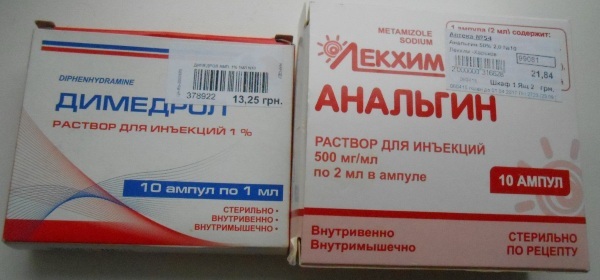
Diphenhydramine greatly increases the effectiveness of drugs that affect the central nervous system. The sedative effect of the drug is significantly increased by monoamine oxidase inhibitors, a special enzyme-catalyst.
You can not take diphenhydramine simultaneously with psychostimulants due to the occurrence of antagonistic interactions. An antihistamine reduces the effectiveness of drugs intended to intoxicate the body and induce vomiting in case of food poisoning.
Parallel reception is highly undesirable. The possibility of combining Diphenhydramine with other sedative and hypnotic drugs, tranquilizers in each case is considered by the doctor separately.
Storage conditions and periods
The drug remains usable for 5 years from the date of manufacture. Opened ampoules are not subject to long-term storage. The optimal temperature regime is up to + 25 ° С.
Conditions of dispensing from pharmacies
Diphenhydramine is a prescription drug. To purchase it at the pharmacy, you must have a special form filled out by a doctor.
Analogs
Some drugs have a principle of pharmacological action similar to Diphenhydramine.
Most popular rating:
-
Analdim. Anesthetic medicine based on metamizole sodium. Available in the form of a solution for injection and rectal suppositories. Used to eliminate pain in burns, neuralgia, radiculitis, in the postoperative period. The standard dose for adults is 1 ampoule 2-3 times a day.
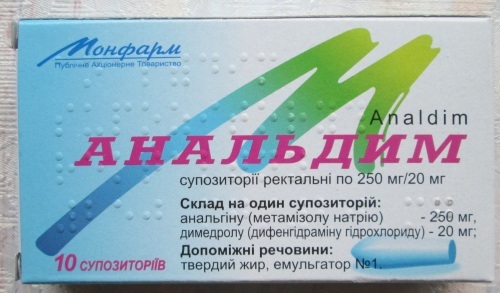
- Allergin. A drug for the removal of anaphylactic and inflammatory symptoms. The active ingredient is diphenhydramine hydrochloride. Used for allergies of any type, inflammation of the upper respiratory tract. Available in ampoules and tablets. In case of acute allergic reactions, 1 injection is prescribed every 6 hours. within 3 days.
- Grandim. Medication with a wide range of pharmacological action. The active ingredient is diphenhydramine. It is produced in the form of a ready-made solution for injection, oral granules, rectal suppositories. Used for acute allergic manifestations. The method of administration is similar to diphenhydramine.
Nowadays, this antihistamine is difficult to find in pharmacies. There are many safer counterparts. Only the low price speaks in favor of Diphenhydramine in ampoules. All drugs that pass the ATX level 4 code are considered its analogues.
Video about antihistamines
Top 6 Antihistamines:

